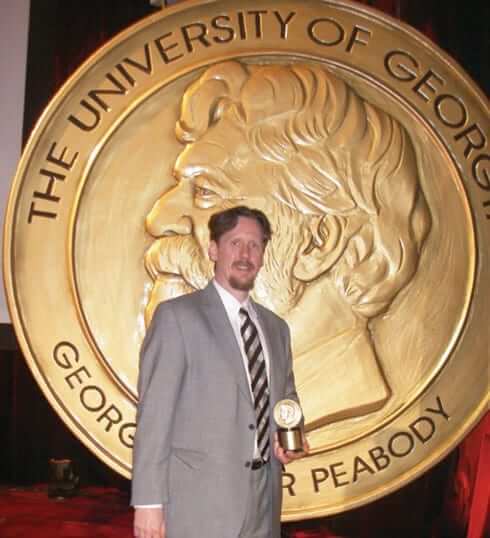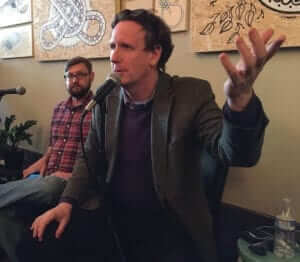A new podcast talks with people about the things that divide them.

In the first moments of the first episode of Us & Them, a new podcast from West Virginia Public Broadcasting, host Trey Kay makes a phone call. We hear the phone ringing, and then a friendly sounding woman with a sing-songy Southern accent picks up and says hello. “That’s my friend Alice Moore,” Kay says. Moore was on the school board where Kay grew up, in Kanawha County, when he was a kid, in the 1970s. “I didn’t know her back then but I knew of her,” Kay says. “There were a lot of people in the valley who thought she was a saint, but the people on my side of the tracks thought she was a whackjob.”
And with that, he’s outlined the premise of Us & Them. The show lives on the line between left and right, conservative and liberal, religious and secular—us and them. Kay calls that zone “the cultural divide” and he’s not shy about which side of that line he hails from. He’s a liberal guy who lives in New York City now. He voted for Obama. He doesn’t go to church much. Alice Moore is pretty much the opposite, a Christian conservative who thinks President Obama is evil. She and Kay spar about their beliefs, but they get along—they’re even friends.
With Us & Them Kay is trying to replicate that friendship. He doesn’t want to put aside ideological differences, exactly, but he wants to discuss them in an open, even-tempered way. “I feel like often if I or somebody else who is liberal or has a progressive point of view, when you hear us described by Rush Limbaugh or some other conservatives it’s as though we have a disease or some type of mental impairment—and that’s not true. And I turn around and go back to my progressive people in New York and I don’t like the way they talk about conservative people either,” he says. “So this podcast is me wanting to reject that.”
Kay and Moore met when he was working on a radio documentary about a controversy that brought a lot of attention to West Virginia in the 1970s. In March of 1974, the Kanawha County School Board was asked to do something school boards do all the time: approve the textbooks that would be used in the county for the following year. A textbook committee suggested the books and normally the board would simply defer to the committee’s judgment and vote to approve. But on this day, at this meeting, Moore took issue with a passage in one about dialectology—the idea that African American English and Appalachian English are equally correct versions of the language. Over the next few weeks, as she looked at all of the county’s textbooks more closely, Moore would speak out about a lot more of the content. One book quoted Malcolm X calling Christians brainwashed. Another explained Freud’s theory about the Oedipus Complex, which says that as children all boys want to kill their fathers and marry their mothers. In all, she thought the books were dismissive of Christianity and taught children to question their parents’ beliefs.
Moore thought secular liberals were trying to brainwash the country’s children—in a lot of ways, but also with these books. A lot of people in Kanawha County, especially in the rural areas outside of Charleston, agreed with her. But inside the city, especially in the affluent neighborhood called South Hills where Kay grew up, people thought she and her supporters were, as he puts it, whackjobs. Over several weeks, the controversy spiraled out of control: 4,500 of the county’s 9,000 students stayed home from school to boycott the books. Someone was shot. Bombs were placed at an elementary school and the school board building. The whole thing didn’t calm down until one protester was given a three-year jail sentence.

“When the thing had success I kind of thought, ‘Well, maybe I’ve tapped into something here,’” Kay says. “I’m not saying it was a more brilliant way to look at these issues, but I thought maybe it was attempting to do it a little differently.” He went on to do another documentary on the culture wars in Texas, but then he had another idea. “As I’m doing all this I’m going and interviewing these really interesting people—but how much of that is going to get into a documentary?” Kay says. “I’m trying to tell these big epic stories, so I might have a fantastic interview that I did with somebody, and it’s really interesting, but it’s never going to see the light of day.” He thought maybe he could use a different format that would let him tell smaller stories. Podcasting was the obvious answer. West Virginia Public Broadcasting agreed to partner with Kay to produce the show.
Us & Them launched on May 1 with an episode about Kay’s relationship with Moore. In later podcasts Kay talks through attitudes about gay people, panhandlers, and abortion—some of the most contentious stuff there is. In every episode, his tone is frank but understanding, his attitude both accepting and critical. “What I found in the textbook controversy is that there are good people on either side,” Kay says. “We probably aren’t going to agree, but this belittling, minimizing, and demonizing— it’s not helping. I’m trying to see if there’s a way we can have a different conversation.”
Written by Shay Maunz












Leave a Reply